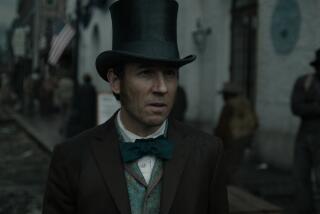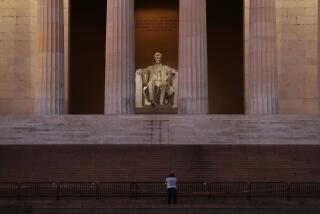Lincoln and FDR movies are a reminder politics is seldom pretty
Two new movies, “Lincoln” and “Hyde Park on the Hudson,” are intimate portraits of the two most consequential presidents of the United States. They are timely reminders that politics has never been pretty and our leaders have never been perfect human beings, but that, without Abraham Lincoln and Franklin Delano Roosevelt, our country might have been lost to the disintegrating influence of lesser men.
“Lincoln” is such a stunningly good movie that I have already seen it twice. Daniel Day-Lewis completely inhabits the person of the 16th president; the actor disappears and we are confronted with as close an approximation of the real man as we are ever likely to see. His Lincoln is not a white marble demigod. He is a loving but imperfect father, a husband at the end of his patience, a country lawyer with a sharp analytical mind and a wily politician who will do just about anything to round up votes in a good cause. We have seen Lincoln’s tortured melancholy before, and Day-Lewis captures that. But, more revealingly, he also displays the irrepressible humor that helped make Lincoln such a hugely popular companion, candidate and leader.
PHOTOS: Top of the Ticket cartoons
Not unlike 2012, politics in the 1860s was polarized. There was no Internet or cable news, but there were multiple newspapers in even small towns, most as partisan and spoiling for a fight as Fox News and MSNBC. A bit like Barack Obama, Lincoln was adored by his fans and vilified in the most vicious and personal ways by his foes. His opponents criticized his wife, made fun of his appearance, questioned his intelligence, accused him of being a dictator and decried his expansion of federal power.
Steven Spielberg’s film is centered on a few final months of Lincoln’s life when the Civil War was coming to a close and Lincoln was determined to get the 13th Amendment to the Constitution passed through Congress – the amendment that would end slavery once and for all. The Democrats of the time were dead set against the amendment, believing it might prolong the war and eventually lead to dangerous results, such as blacks being allowed to vote and hold high office. Lincoln’s Republicans were split between the radicals who wanted immediate abolition and the conservatives who saw the amendment more as a bargaining chip to attain peace.
For those who still cling to the idea that collegial bipartisanship is the best way to achieve good government, this movie is a reminder that politics has very seldom been so cordial and clean. Lincoln saved the union, freed the slaves and became the most revered of America’s presidents by compromising when needed, forming convenient alliances with men who were not his friends and knowing when to seize the moment, play hardball and display a will of steel. Show him a fiscal cliff and he would know how to drive a bargain and round up votes.
“Hyde Park on the Hudson” is a much more slight movie. It tells the story of a single weekend in the 1930s when the king and queen of England paid a visit to President Franklin Roosevelt at his family home in the New York countryside. Bill Murray does a good job portraying FDR, but does not inhabit the man the way Day-Lewis transformed himself into Lincoln. Still, the film offers vivid insights into the private life of the president who saved the nation from collapse during the Great Depression, prosecuted the Second World War and established a vastly more robust federal government.
As the movie shows, Roosevelt’s achievements emanated from a curiously complex household. He had mistresses who were permanent and simultaneous in-house companions. The first lady had her own separate accommodations and her own intimate female friends. And all of this was hidden from public view. Hidden, too, with the complicity of the press, was FDR’s severe disability. An aide would carry the president to his car in full view of news photographers, but no picture would be taken until Roosevelt had composed himself and raised his confident grin to the cameras.
The media were far most constrained and compliant in Roosevelt’s time than in either Lincoln’s era or our own. At the end of “Hyde Park on the Hudson” I wondered whether FDR’s political career could have survived exposure of his personal relationships and the ravages of polio. My guess is that Americans would have adjusted to his physical condition but would not have tolerated his unconventional marital arrangement.
And would America have been better off knowing all the secrets at the cost of losing FDR’s immense political talents?
More to Read
A cure for the common opinion
Get thought-provoking perspectives with our weekly newsletter.
You may occasionally receive promotional content from the Los Angeles Times.







